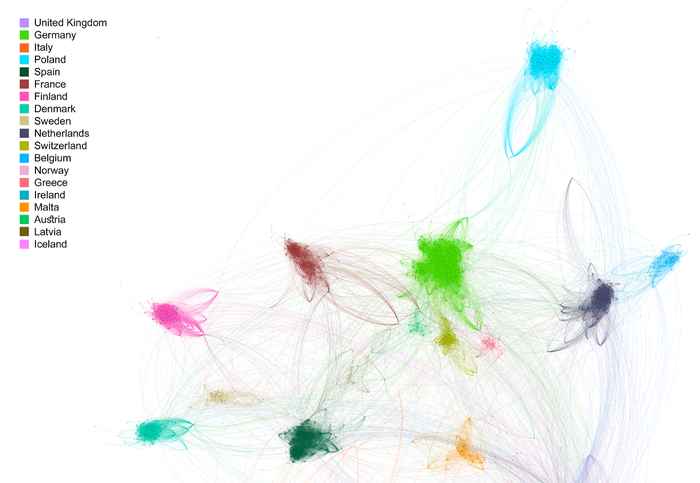UvA launches world’s most comprehensive database of Twitter use by parliamentarians
21 September 2020

The TPD – possibly the world’s most comprehensive database of its kind - offers data journalists and scholars unprecedented possibilities for examining which politicians are influential, how often parties attack each other or work together, and which issues are the most contentious online. It features politicians from 26 countries, including many European and English-speaking countries, as well as the EU parliament, and collates their Twitter usage going back to September 2017. The results of the researchers’ first investigations of the database have been published in the journal PLOS One.
To illustrate the opportunities for comparative and transnational analysis that the TPD opens up, the researchers - Livia van Vliet, Petter Törnberg and Justus Uitermark - conducted a number of preliminary studies in their recently published paper. For example, they looked at how political parties differ in their use of hashtags, and how the use of certain hashtags might be exacerbating pre-existing political divisions. They also found that retweets could be used as a proxy for coalitions and divisions in parliaments. They found four different types of retweets networks: divided, bipolar, fringe party and cohesive. These structures could show whether or not there is a lot of endorsement across party lines, or if the political cultures in question appear more strictly partisan.
Compare different countries, parties, or groupings
The TPD has been designed to move beyond the one-off nature of most Twitter-based research and in the direction of systematic and rigorous comparative and transnational analysis. The TPD incorporates - in addition to data collected through Twitter’s real-time streaming application programming interface and governmental websites - data from the Manifesto Project Database, the Electoral System Design Database, the ParlGov database and the Chapel Hill Expert Survey. By bringing these different data sources together, it becomes possible to compare elements of different countries, political parties, political party groupings, and different kinds of democracies. The database was built under the ODYCCEUS project, an EU project which seeks conceptual breakthroughs in Global Systems Science, including a fine-grained representation of cultural conflicts based on conceptual spaces and sophisticated text analysis.
The Twitter Parliamentarian Database provides a starting point for studying politicians’ communications, cooperation and disagreements, both within individual countries and across borders for cross-country comparative and transnational research. As far as we are aware, the database – which is available online for anyone to use - is the most comprehensive database of parliamentarians on Twitter that is currently available.Research team member Livia van Vliet
Publication details:
Van Vliet L, Törnberg P, Uitermark J (2020) The Twitter parliamentarian database: Analyzing Twitter politics across 26 countries. PLOS ONE 15(9): https://doi.org/10.1371/journal.pone.0237073